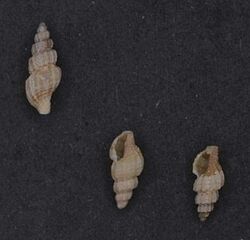Biology:Tritonoturris capensis
| Tritonoturris capensis | |
|---|---|

| |
| Shell of Tritonoturris capensis at Naturalis Biodiversity Center | |
| Scientific classification | |
| Domain: | Eukaryota |
| Kingdom: | Animalia |
| Phylum: | Mollusca |
| Class: | Gastropoda |
| Subclass: | Caenogastropoda |
| Order: | Neogastropoda |
| Superfamily: | Conoidea |
| Family: | Raphitomidae |
| Genus: | Tritonoturris |
| Species: | T. capensis
|
| Binomial name | |
| Tritonoturris capensis (Smith E. A., 1882)
| |
| Synonyms[1] | |
| |
Tritonoturris capensis is a species of sea snail, a marine gastropod mollusk in the family Raphitomidae.[1] often found along the coast of South Africa . Tritonoturris capensis is highly regarded for its beautiful shell and is sought after by collectors and shell enthusiasts.
The shell can grow up to 4-5 centimeters in height and is characterized by distinct spiral ridges and fine, intricate patterns. The coloration of the shell varies from creamy white to light brown, often adorned with reddish-brown or dark brown blotches and bands.[2]
This species is typically found in sandy or muddy habitats, particularly in the intertidal zone and subtidal regions. It is known to inhabit depths ranging from shallow waters to around 100 meters.[3] Tritonoturris capensis is primarily a predator, feeding on small marine invertebrates such as crustaceans and other gastropods. It uses its long, extensible proboscis to capture prey.
Description
The length of the shell attains 13 mm, its diameter 5 mm.
Distribution
This marine species occurs off Port Elizabeth and False Bay, South Africa and off Mozambique.
References
- ↑ 1.0 1.1 Tritonoturris capensis (Smith E. A., 1882). Retrieved through: World Register of Marine Species on 5 April 2010.
- ↑ "Molluscabase" (in en). http://www.molluscabase.org/.
- ↑ "WoRMS - World Register of Marine Species". https://www.marinespecies.org/.
- Steyn, D.G. & Lussi, M. (1998) Marine Shells of South Africa. An Illustrated Collector's Guide to Beached Shells. Ekogilde Publishers, Hartebeespoort, South Africa, ii + 264 pp.
External links
- Thiele J., 1925. Gastropoden der Deutschen Tiefsee-Expedition. In:. Wissenschaftliche Ergebnisse der Deutschen Tiefsee-Expedition auf dem Dampfer "Valdivia" 1898–1899 II. Teil, vol. 17, No. 2, Gustav Fischer, Berlin
- Powell A.W.B.(1966) The molluscan families Speightiidae and Turridae: an evaluation of the valid taxa, both recent and fossil, with lists of characteristic species; Bulletin of the Auckland Institute and Museum ; no. 5
- Tucker, J.K. (2004). "Catalog of recent and fossil turrids (Mollusca: Gastropoda)". Zootaxa 682: 1–1295. http://www.mapress.com/zootaxa/2004f/z00682f.pdf.
- Smith E.A. (1882). Diagnoses of new species of Pleurotomidae in the British Museum. Annals and Magazine of Natural History. ser. 5, 10: 296-306
- Biolib.cz: image
Wikidata ☰ Q3718466 entry
 |

